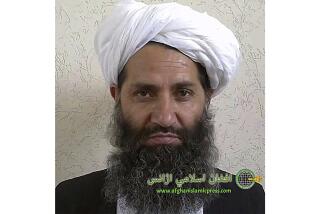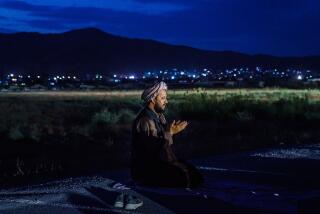Khatami sees negative outcome if Taliban is forced out
(RealVideo and QuickTime)
- Share via
NEW YORK — Iran’s President Mohammad Khatami warned Monday that forcing the Taliban out of Kabul or ending its rule altogether probably would not end the fighting -- or the Taliban’s presence -- in Afghanistan.
“Even if the Taliban is ousted in Kabul, I’m sorry to say, my feeling is that Afghanistan will enter into a period of long warfare,” he told a small group of reporters at a breakfast meeting.
The Taliban almost surely would launch a guerrilla war from the mountains and caves of Afghanistan, targeting opposition forces, a new government and any foreign presence deployed to help return order to the war-ravaged country, he predicted.
Iran is particularly sensitive about the ongoing conflict because it has the second-longest border with Afghanistan, after Pakistan. Iran’s position on Afghan issues is considered pivotal to a peaceful resolution, in part because, along with Russia and India, it is among the three largest backers of the Northern Alliance.
Khatami, who for years has warned the West about the dangers of the Taliban, also cautioned the United States against sending ground troops to Afghanistan, predicting they would worsen U.S. problems in the Islamic world.
Khatami also said the airstrikes should stop altogether, not only during the Muslim holy month of Ramadan, which begins once a new moon is sighted later this week. He urged the United States instead to develop a political strategy to oust the Taliban and isolate Saudi militant Osama bin Laden.
In his speech, he questioned resorting to “violence and revenge” with the “most destructive modern weapons” as an effective long-term response. He urged the United Nations, rather than the United States, to coordinate a single global strategy that would tap the “participation and cooperation of all members of the human community.”
On Monday, he also told reporters that the U.S. military campaign was on the verge of backfiring in terms of public opinion. He warned that the war to fight terrorism “might actually spread terrorism” because of the sympathetic images of women and children being killed by bombs.
“If this continues, I am concerned that extremist groups will actually be strengthened,” he said. “If we can’t find the terrorists, kill, destroy or bring them to justice, then at least we must not turn them into heroes in some parts of the world.”
Khatami’s remarks came shortly before U.S. Secretary of State Colin L. Powell met and shook hands with his Iranian counterpart, Foreign Minister Kamal Kharrazi, who had expressed official Iranian condolences for the Sept. 11 attacks. It was the first public handshake between U.S. and Iranian Cabinet officials since the 1979 takeover of the American Embassy in the Iranian capital, Tehran, and the seizure of 52 American hostages for 444 days.
The two men were among top officials from Afghanistan’s six neighbors plus the United States and Russia assembled at the United Nations Monday to discuss post-Taliban rule.
Khatami, who has twice won landslide election victories campaigning for democratic reforms, said Iran was in agreement with the United States, Russia and other front-line states that the only solution for Afghanistan is a democratic government that embraces all ethnic groups. But he said that the time was “not yet ripe” for elections due to the country’s destruction and pervasive poverty.
In the meantime, a transition government should be installed to prevent the spread of violence among the disparate ethnic, religious and tribal factions. During a specified time period, the United Nations should help administer the country, after which Afghans would vote to determine their own fate, he said.
In his U.N. address, Khatami -- whose country is on the U.S. State Department’s list of seven state sponsors of terrorism -- said that since Sept. 11, nations around the world “walk hand-in-hand” with the American nation.
More to Read
Sign up for Essential California
The most important California stories and recommendations in your inbox every morning.
You may occasionally receive promotional content from the Los Angeles Times.













